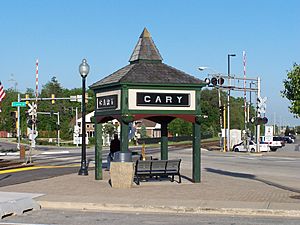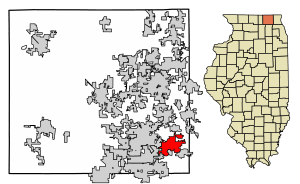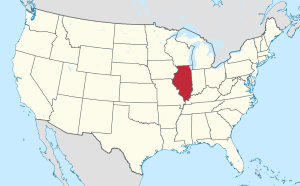Cary, Illinois facts for kids
Quick facts for kids
Cary, Illinois
Cary-Grove
|
|
|---|---|

Cary sign near the train station
|
|

Location of Cary in McHenry County, Illinois.
|
|

Location of Illinois in the United States
|
|
| Country | United States |
| State | Illinois |
| County | McHenry, Lake |
| Township | Algonquin, Cuba |
| Founded | 1833 |
| Founded by | William Dennison Cary |
| Government | |
| • Type | Non-Home-Rule under Mayor/Trustee |
| Area | |
| • Total | 6.60 sq mi (17.10 km2) |
| • Land | 6.53 sq mi (16.91 km2) |
| • Water | 0.07 sq mi (0.19 km2) |
| Elevation | 823 ft (251 m) |
| Population
(2020)
|
|
| • Total | 17,826 |
| • Density | 2,730.70/sq mi (1,054.37/km2) |
| Time zone | UTC-6 (CST) |
| • Summer (DST) | UTC-5 (CDT) |
| ZIP Code(s) |
60013
|
| Area code(s) | 847, 224 |
| FIPS code | 17-11592 |
| Wikimedia Commons | Cary, Illinois |
| Website | www.caryillinois.com |
Cary is a village located in Algonquin Township, McHenry County, Illinois, and Cuba Township, Lake County, Illinois, United States. Per the 2020 census, the population was 17,826.
Founding
In 1841, William Dennison Cary purchased 82 acres (33 ha) for $1.25 an acre at the location of the current town and built a farm. In 1856, Cary included a train station for the Illinois & Wisconsin Railway which connected Cary to Chicago and Janesville. The site was approved and a post office was added with the designation "Cary Station." The community around Cary Station was incorporated in 1893 as Cary, Illinois.
Early farmers saw this new railway as an opportunity. The economy relied heavily on selling produce, mainly pickles, and the farmers utilized the railway to conduct business with more industrialized cities such as St. Louis and Chicago. The success of this transportation enterprise helped transform Cary into the suburban community it is today. People traveled by rail and most commerce became dependent on the railroad.
In the 1950s, highway transportation overtook rail as the primary means of moving people and goods. Northwest Highway (U.S. 14) parallels the railroad right-of-way, which has been the Union Pacific Northwest Metra line since the Union Pacific merged with the Chicago & North Western in 1995.
Geography
Cary is located at 42°12′47″N 88°14′54″W / 42.21306°N 88.24833°W (42.2129566, -88.2483260).
According to the 2010 census, Cary has a total area of 6.358 square miles (16.47 km2), of which 6.27 square miles (16.24 km2) (or 98.62%) is land and 0.088 square miles (0.23 km2) (or 1.38%) is water. It is located on the Fox River.
Demographics
| Historical population | |||
|---|---|---|---|
| Census | Pop. | %± | |
| 1880 | 161 | — | |
| 1900 | 398 | — | |
| 1910 | 679 | 70.6% | |
| 1920 | 463 | −31.8% | |
| 1930 | 731 | 57.9% | |
| 1940 | 707 | −3.3% | |
| 1950 | 943 | 33.4% | |
| 1960 | 2,530 | 168.3% | |
| 1970 | 4,358 | 72.3% | |
| 1980 | 6,640 | 52.4% | |
| 1990 | 10,043 | 51.3% | |
| 2000 | 15,531 | 54.6% | |
| 2010 | 18,271 | 17.6% | |
| 2020 | 17,826 | −2.4% | |
| U.S. Decennial Census 2010 2020 |
|||
| Race / Ethnicity (NH = Non-Hispanic) | Pop 2000 | Pop 2010 | Pop 2020 | % 2000 | % 2010 | % 2020 |
|---|---|---|---|---|---|---|
| White alone (NH) | 14,311 | 15,801 | 14,417 | 92.14% | 86.48% | 80.88% |
| Black or African American alone (NH) | 60 | 113 | 134 | 0.39% | 0.62% | 0.75% |
| Native American or Alaska Native alone (NH) | 18 | 10 | 25 | 0.12% | 0.05% | 0.14% |
| Asian alone (NH) | 210 | 440 | 516 | 1.35% | 2.41% | 2.89% |
| Pacific Islander alone (NH) | 4 | 2 | 4 | 0.03% | 0.01% | 0.02% |
| Other race alone (NH) | 3 | 19 | 52 | 0.02% | 0.10% | 0.29% |
| Mixed race or Multiracial (NH) | 82 | 260 | 578 | 0.53% | 1.42% | 3.24% |
| Hispanic or Latino (any race) | 843 | 1,626 | 2,100 | 5.43% | 8.90% | 11.78% |
| Total | 15,531 | 18,271 | 17,826 | 100.00% | 100.00% | 100.00% |
The population of Cary was 17,826 as of 2020.
There were 6,424 households, out of which 2838 had children under the age of 18 living with them.
The median income for a household in the village was $100,339, and the median income for a family was $111,065.
Education
Cary is mainly served by Community High School District 155 for high school students, specifically by Cary-Grove High School and Prairie Ridge High School, and School District 26 for elementary and middle school students. Some portions of Cary also are served by Crystal Lake Community Consolidated School District 47 and Community Unit School District 300.
Trinity Oaks Christian Academy, a non-denominational Christian school, is located in Cary, as well as Saints Peter and Paul, a Roman Catholic school and parish.
Transportation
U.S. Route 14, locally known as Northwest Highway, passes through Cary between its northwest and southeast borders.
Illinois Route 31 forms part of Cary's western border.
Metra's Union Pacific Northwest Line has a station in Cary and operates daily service to Ogilvie Transportation Center in downtown Chicago.
Lake in the Hills Airport is approximately two miles west of Cary's west border.
Notable people
- Brandon Barnes, soccer player
- Drew Conner, soccer player
- A. J. Raebel, Canadian football player
- Michael Glasder, ski jumper XXIII Olympic Winter Games (raised in Cary)
- Quinn Priester, MLB baseball player, Pittsburgh Pirates pitcher, (attended Cary-Grove High School)
- Jimmy John Liautaud, founder of Jimmy John's
- Paul Wertico, jazz drummer (member of the Pat Metheny Group for many years), winner of 7 Grammy Awards (raised in Cary)
See also
 In Spanish: Cary (Illinois) para niños
In Spanish: Cary (Illinois) para niños

